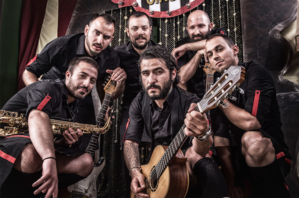분수크로
Bonsucro | |
| 포메이션 | 2008 |
|---|---|
| 유형 | 복수 이해당사자 이니셔티브 |
| 초점 | 지속 가능한 농업, 지속 가능한 바이오 연료, 사탕수수 |
| 본부 | 런던 |
| 웹사이트 | bonsucro |
이전에 호출됨 | 더 나은 사탕수수 이니셔티브(BSI) |
분수크로는 지속 가능한 사탕수수 촉진을 위해 2008년 설립된 국제 비영리 복수 이해당사자 거버넌스 그룹이다.[1][2] 이것의 명시 목적은 '경제적 생존능력의 필요성을 인식하면서 사탕수수 생산의 환경적, 사회적 영향'[3]을 줄이는 것이다. 지속가능성 기준 설정과 에탄올, 설탕, 당밀 등 사탕수수 제품 인증 등을 통해 이를 실현한다. 2019년[update] 기준 사탕수수에 심은 전 세계 토지의 25%가 분수크로 인증을 받았다. 분수크로는 농업인, 제분업자, 상인, 바이어, 지원기관 등 전 세계 40여 개국에 500여 명의 회원이 활동하고 있다.[4]
Bonsucro은 몇 안 되는 인증 온실 가스 emissions,[5]고 결과적으로 유럽 위원회는 Bonsucro 표준은 표준 전체 준수하기 위해서 변경될 당시는 에탄올 fuel,[6][7]은 수입하는 EURenewables 명령(EURED)적합성을 입증하는 데 사용될 수 있게 말했다 대책을 발전시켰다고.y.[8] 본수크로와 지속가능한 바이오소재에 관한 라운드테이블에서 정한 표준은 모두 실제적으로 EU RED 가이드라인을 확대하여 국가법에 규정된 토지점유율 문제와 같은 다른 요인을 포함시키는 것으로 지적되어 왔다.[9]
콜롬비아 정책 입안자들은 EU 시장 접근성이 중요하다고 지적하고 있으며, EU는 40%의 본수크로 사탕수수를 목표로 하는 국가 정책을 추진하고 있다고 묘사하고 있다.[10] 그러나 2014년 11월 현재 콜롬비아에서는 아직 인증을 획득한 제분소가 없지만, 바이오 연료와 관련된 이러한 인증 사용은 콜롬비아의 강화 결과에 대한 우려를 야기했다.[11] 브라질에서 최초로 분수크로 인증을 받은 에탄올 연료는 2012년 로테르담 항구를 통해 유럽으로 처음 수입됐다.[12][13]
참조
- ^ R.A. Diaz-Chavez; A. Lerrner (3 July 2013). "Certification and Standards for Sugar Cane and Bioenergy". In Francis X. Johnson (ed.). Bioenergy for Sustainable Development and International Competitiveness: The Role of Sugar Cane in Africa. Vikram Seebaluck. Routledge. p. 287. ISBN 978-1-136-52955-9.
- ^ Smedley, Tim (15 September 2014). "Sustainable sugar: Coca-Cola and BP signed up but will it go mainstream?". The Guardian. London. Retrieved 16 November 2014.
- ^ "A guide to Bonsucro". Bonsucro. Retrieved 2014-08-24.
- ^ "A little more about us". Bonsucro. Retrieved 16 September 2019.
- ^ Steering Committee of the State-of-Knowledge Assessment of Standards and Certification. Toward Sustainability: The Roles and Limits of Certification (PDF). Resolve. p. 98.
- ^ European Communities (2011-07-19). "Commission Implementing Decision of 19 July 2011 on the recognition of the 'Bonsucro EU' scheme for demonstrating compliance with the sustainability criteria under Directives 2009/28/EC and 2009/30/EC of the European Parliament and of the Council". Official Journal of the European Union. Retrieved 2014-08-24.
- ^ M Ismail; A Rossi; N Geiger (2011). Compilation of Bioenergy Sustainability Initiatives: Update (PDF). Food and Agriculture Organization of the UN.
- ^ Christine Moser; Tine Hildebrandt; Robert Bailis (14 November 2013). "International Sustainability Standards and Certification". In Barry D. Solomon (ed.). Sustainable Development of Biofuels in Latin America and the Caribbean. Robert Bailis. Springer New York. ISBN 978-1-4614-9274-0.
- ^ Fortin, Elizabeth; Richardson, Ben (2013). "Certification Schemes and the Governance of Land: Enforcing Standards or Enabling Scrutiny?" (PDF). Globalizations. 10 (1): 141–159. doi:10.1080/14747731.2013.760910. ISSN 1474-7731.
- ^ Roundtable on Environmental Health Sciences, Research, and Medicine; Board on Population Health and Public Health Practice; Institute of Medicine (2 April 2014). The Nexus of Biofuels, Climate Change, and Human Health:: Workshop Summary. National Academies Press. pp. 119–. ISBN 978-0-309-29244-3.CS1 maint: 여러 이름: 작성자 목록(링크)
- ^ Selfa, Theresa; Bain, Carmen; Moreno, Renata (2014). "Depoliticizing land and water "grabs" in Colombia: the limits of Bonsucro certification for enhancing sustainable biofuel practices". Agriculture and Human Values. 31 (3): 455–468. doi:10.1007/s10460-014-9509-3. ISSN 0889-048X.
- ^ "In the future all sugarcane ethanol will be Bonsucro certified". Solidaridadnetwork.org. Solidaridad. 2012. Archived from the original on 2013-10-28. Retrieved 2014-08-25.
- ^ "Port of Rotterdam Authority - Argos Energies buys first Bonsucro certified ethanol for the European consumer market". Port of Rotterdam. 2012. Retrieved 2014-08-25.


